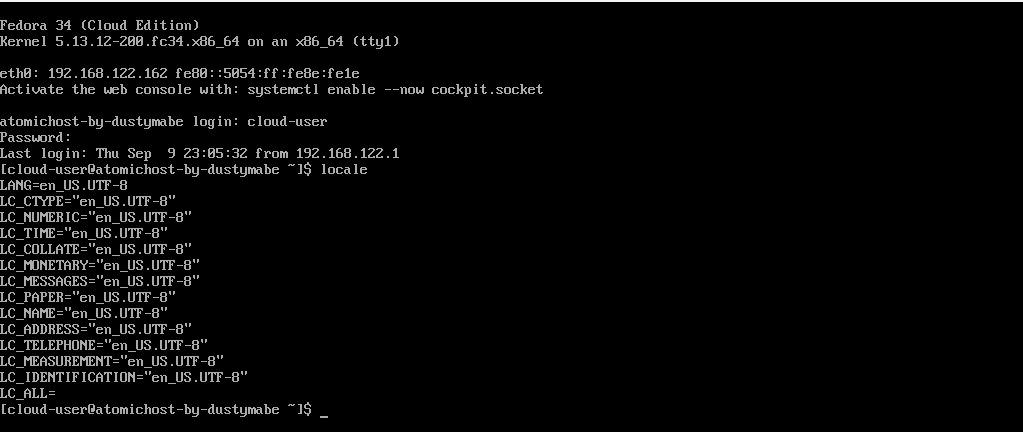-
Notifications
You must be signed in to change notification settings - Fork 60
New issue
Have a question about this project? Sign up for a free GitHub account to open an issue and contact its maintainers and the community.
By clicking “Sign up for GitHub”, you agree to our terms of service and privacy statement. We’ll occasionally send you account related emails.
Already on GitHub? Sign in to your account
shell: /etc/locale.conf is missing, the default POSIX has no UTF-8 support
#568
Comments
|
hey @eriksjolund - is this still reproducible? |
|
@dustymabe Yes it is reproducible but I had to use the keymap se instead of sv-latin1. ( I skipped the command
(But this time the laptop makes a loud system beep) |
|
I think this is a locale mismatch, specifically in relation to UTF-8 handling. |
|
By the way this is easier to observe on a random node via SSH: |
|
@lucab asked for |
|
@lucab - are you using |
|
|
|
@dustymabe neither, that was on a plain qemu-kvm with the |
|
I see. So basically we don't see it mainly because we typically SSH in and |
|
I'm slightly relieved that system services seems to get a sane So at least this can be narrowed down to users interactive shells only, hopefully. |
|
Ok, I think this is due to the fact that we don't have a But now, a bigger point. This usually gets set up by So, bottom line, I think we'd need systemd to expose its default as a (factory?) file somewhere, and then have a mechanism to symlink/copy that to the expected /etc path. |
POSIX has no UTF-8 support
|
Maybe we can do |
|
Ah, glad you were finally able to localize the problem! We can ship this file statically in our config overlay too instead of doing it via a script. Are you sure this is "usually" set up by |
|
Oh yes, there is probably not a single definition of a "usual" flow, and likely Anaconda plays a role too. I was going by the definition in the systemd docs:
|
|
Indeed, looks like the relevant Anaconda code is here. |
|
Rather than implement this for each OSTree variant in Fedora this feels almost like this could/should be a systemd tmpfile. i.e. if it doesn't exist then copy |
|
Yes, we can quickfix this via a static file in the overlay and a tmpfiles.d fragment. |
|
@lucab indeed. What you propose in systemd/systemd#21723 was exactly what I was thinking/proposing as well (I'm just bad at explaining it). Thank you for writing that up! |
|
Fixed upstream by systemd/systemd@2588920 |
|
This got released in systemd v251: https://github.com/systemd/systemd/releases/tag/v251. |
|
The fix for this went into |
|
The fix for this went into |
|
I'm not able to try out the new releases on the laptop where I originally reproduced the bug. |
|
I can confirm that this seems to be fixed on current The default locale for interactive shells is now |
|
The fix for this went into |

On a newly bought HP Elitebook 850 G6 laptop that has a keyboard with Swedish keyboard layout, I did the following
sudo localectl set-keymap sv-latin1stty -aå. The terminal now looks like:å. The terminal now looks like:(But this time the laptop makes a loud system beep)
Behavior on Fedora 32
I performed a similar test on a 2 year old HP Elitebook 850 G5 laptop that has a keyboard with Swedish keyboard layout and was installed with Fedora 32. During its installation Swedish keyboard was chosen.
I did the following
sudo localectl statusand my passwordstty -aå. The terminal now looks like:å. The terminal now looks like:(But this time the laptop makes a loud system beep)
I compared the outputs from
stty -abetween Fedora CoreOS and Fedora 32. They were identical.The text was updated successfully, but these errors were encountered: